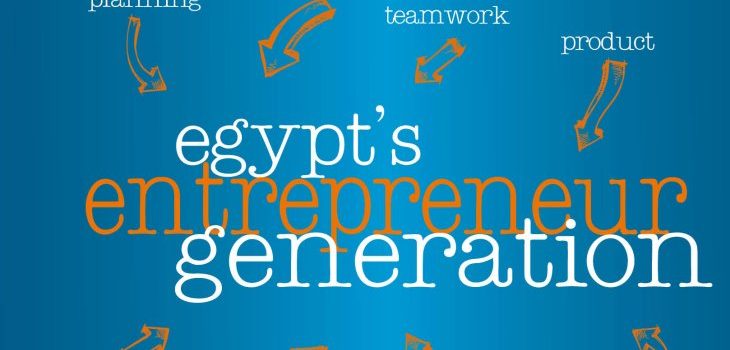
The Entrepreneurial Revolution in Egypt, an Ecosystem Approach
Okay, this is a piece of old writing that I ran by which was the original script published afterwards in an Article at Business Today, HERE, I didn’t publish it by this time as a better-edited version was hosted on Business Today, but I found it among my files and used it in a study about the ecosystem in the last couple of years.
Below information is outdated, I just didn’t feel like posting it on the past, so, so that was in May 2012. I will be publishing updated about how I see the ecosystem today and the shift in Egypreneur approach, why, how and till when.
——————-
We all remember the entrepreneurial stories of current Egyptian business leaders who started with little resources with the absence of any structured support and they successfully grew their businesses to a national and international scale. There is no doubt that the previous generation of Egyptian entrepreneurs who were able to assemble the ecosystem necessary for their ventures to survive and grow have positively influenced the state of the Egyptian economy.
While eyes are still gazing at the generation of the Egyptian revolution and speculations about the future of Egypt and its economy is in the air. The current rate of unemployment and lack of productivity in the economy keeps a pessimistic view about the short-term effect of the political change on the economy, yet an active community of youth entrepreneurs in Egypt is still being boldly hopeful and optimistic about the future.
Economic studies and examples of countries that pursued entrepreneurship successfully shows a dramatic increase in employment rate, economic growth and GDP. Entrepreneurship presents an opportunity for the Egyptian economy to flourish and for the country to start a new era pursuing the post-revolution more free and open mentality in becoming a startup nation.
We have every right to think that a new generation of entrepreneurs is being born right now, the increasing number of events, competitions, activities, NGOs and private sector entities getting involved in entrepreneurs support shows a positive movement towards a more entrepreneurial new Egypt. While others have a different view:
“As entrepreneurship has grown in Egypt as a concept; with better social acceptance, a host of training courses and even the government jumping on the bandwagon, successful entrepreneurial ventures have not grown as fast as the number of organizations that claim to promote entrepreneurship. I suppose that’s the price of being fashionable” Eric Zoetmulder
Eric Zoetmulder, a Cairo-based management consultant and close observer to the entrepreneurship scene in Egypt argues that these activities had only contributed to building a society of “entrepreneurship entrepreneurs” a small society of those attending, involving and showing enthusiasm towards becoming entrepreneurs and while an increasing numbers of activities is taking place, the practical output in successful startups had not been up to the expectations and might not present the opportunity to ignite an entrepreneurial movement just yet.
More people argue that fostering entrepreneurship and providing outcomes from all these entrepreneurship-focused activities can only be done by a holistic approach and proper mapping and analysis to what’s happening and what needs to be done and assembling a coherent set of entities its objective is to serve entrepreneurs at different stages in different sectors, clusters and geographical areas.
By then the entrepreneurship ecosystem can be defined as a naturally assembled set of entities with interest to serve entrepreneurs at specific stage of development in a specific sector, cluster or geographical area. The word ecosystem implies being naturally assembled which guarantees sustainability as interest and benefits was the factor to initially get involved in the cycle of supporting entrepreneurs.
In a rapidly changing sector with potential for innovation like ICT, we can see how initiatives from Microsoft, Intel, Nokia, Orange and others tapping into the community of entrepreneurs to promote their technologies and expand the use of their products have participated in building a more developed ecosystem in ICT.
The climate, environment or ecosystem entrepreneurs are operating within will have the biggest influence in inspiring more entrepreneurs to jump in and will decide on the rate of successes and the possibilities of growth for existing startups. By then the future of entrepreneurship in Egypt is determined by the ability of current stakeholders to assemble themselves in a way that maximizes the benefit of entrepreneurs and to support and even “guard” their work.
In his Harvard Business Review Article – How to start an entrepreneurial revolution, Daniel J. Isenberg, mentions 10 factors to be taken into consideration while building an entrepreneurship ecosystem with potential to empower a new generation of entrepreneurs and really start an entrepreneurial movement:
- Stop emulating Silicon Valley
- Tailor an ecosystem around your own particular characteristics
- Engage the entrepreneurship stakeholders early on
- Support the high potential entrepreneurs
- Get some visible successes, even by “brute force” if necessary
- Change the culture head on
- Stress the roots: don’t provide easy money
- Pave the footpath
- Remove bureaucratic obstacles for entrepreneurs
- Experiment relentlessly and holistically
Daniel argues that what really ignites an entrepreneurial revolution is a holistic approach to the entrepreneurship ecosystem and engaging all stakeholders in supporting entrepreneurs at different stages, in different sectors and clusters. Trying to replicate other models like Silicon Valley would take a generation 30-years to start showing practical results, while it might take a few years if the entrepreneurship ecosystem is analyzed and addressed correctly.
With this logic, then Entrepreneurial renaissance in Egypt can only be accomplished through an ecosystem that provides entrepreneurs with all needed support at different stages of growth from ideation, business model generation, team building, seed funding .etc. That’s when analyzing and growing the entrepreneurship ecosystem in Egypt becomes a serious matter for the growth of the economy at a new stage Egypt is entering.
Egypreneur, a project I started back in 2008 as a young entrepreneur to explore possible opportunities to meet fellow entrepreneurs and find out more about what’s out there for them, developed with time to take the lead in inspiring entrepreneurs in Egypt and support their startups by connecting them with opportunities already available from the ecosystem.
At Egypreneur we fully believe in the importance of having enough intelligence about the ecosystem and understanding who is doing what to support entrepreneurs. We initiated a project through which we were able to identify and analyze 350+ organizations that’s involved in supporting entrepreneurs in different ways from ideas generation and innovation support to shared workspaces to funding sources .etc
We believe that availability of the information of who’s doing what in the ecosystem and using it to influence what comes next will have a positive impact on Egyptian entrepreneurs who we’re here to inspire and support. The outcome from the current phase of the mapping project will be available online at (www.ecosystemmap.me) and long term work on analyzing the ecosystem at different sectors, clusters will be sustained and presented there as well.
From an entrepreneur’s perspective the focus on getting the support needed to succeed and passing his/her current stage to the next, at Egypreneur we’re launching a network just for that purpose. (www.egypreneur.com) is planned to gather both our expanding community of entrepreneurs and the 350+ organizations interested in supporting them to serve as a platform providing entrepreneurs with all what they need at all stages.
Exploring the current state of entrepreneurship ecosystem in Egypt through different examples can be a good start to assess what happened, what’s happening and what needs to happen to scale the effect of entrepreneurship and to start really showing results on economic growth and employment rate.
Culture plays a major role in creating an ecosystem for entrepreneurs; most Egyptian entrepreneurs state that our culture doesn’t tolerate risk and failure. Entrepreneurs quitting their jobs or ignoring their academic studies to pursue a business opportunity are not expected to be faced with tolerance and support from their families.
In the co-working space he started in Maadi, Mazen Helmy is experiencing a smaller version of the ecosystem in Egypt. Entrepreneurs setting up their companies and in need of a workspace and either can’t afford or don’t need a separate office space at an initial stage use The District not only as a place to work but more importantly to be a part of a community and ecosystem with varied expertise, backgrounds and service to offer.
In the co-working space a small ecosystem gathers itself to help everyone involved; results from a three months of operations starts to show, May GahAllah just moved to Nubai executing a development project and starting a foundation, May found The District and its ecosystem a suitable place to initiate her project while staying in Cairo.
Mr. Ahmed Dakrouri, do have an interesting story, as an MIT graduate with years of professional experience, after the loss of his father who had been leading family’s developmental work in their home town in Minya. Mr. Dakrouri was left with a hard decision to make, whether to end the development work carried by his family for three generations or decide to head to the south and dedicate his time to leading it.
Mr. Dakrouri has chosen to continue his family’s path and currently focusing on promoting entrepreneurship and creating an ecosystem for entrepreneurs in Abu Korkas, Minya to start and scale successful businesses through Abu Korkas-Minya Association for Economic, Social and Environmental Development.
In a confident tone, Mr. Dakrouri states that he could see serious opportunities for growth in a few clusters in Minya if only stakeholders who’re operating very well in Cairo can expand their activities there providing support to the association work, the power of entrepreneurs can be unleashed and we can sit and watch new clusters and Egyptian products getting exported from there.
In an effort from the Ministry of Communication and Information Technology through its Technology Innovation and Entrepreneurship Center (TIEC); Hayiy initiative launched last March, an initiative stimulating the local ecosystem in different Egyptian governorates and allowing local entrepreneurs to step up and get involved in solving problems of their society.
Being a part of the promotion campaign for Hayiy in around ten Egyptian governorates, I could obviously see the level of energy and desire among Egyptian youth to pursue the entrepreneurial path, still the ecosystem in each of this governorate needs a lot of effort to stimulated and effectively support the ambitions of young potential entrepreneurs.
Flat6Labs is another example of an accelerator that built and ecosystem around itself to guarantee the quality of experience entrepreneurs who join it will have. In partnership with the American University in Cairo, Sawari Ventures provides seed funding for startups accepted to be accelerated through Flat6Labs, last round, entrepreneurs received mentorship from CEOs of industry leading companies and gained media exposure.
In the final presentations graduating last round, Hany El-Sonbaty, co-founder of the VC firm financing Flat6Labs invited other investors to get aboard in investing in graduating entrepreneurs. The network of entrepreneurs, investors, mentors and business executive created around Flat6Labs is a good example of supportive ecosystem to entrepreneurs.
INJAZ is another NGO who was able to foster the ecosystem for the benefit of entrepreneurs getting involved in their “company program” seeking to give students the experience to start and run their businesses at a sensitive stage at college when everyone is thinking of a career track to pursue. Last year, INJAZ were able to tap into private sector entities to provide seed funding and mentorship to successfully graduating startups from its program.
Now, a graduating startup from INJAZ can tour around a large corporate like Mobinil preparing their marketing strategy with the help of Mobinil marketing team and learning how to project and take care of their finances from their finance department, while being initially seed-funded through it. This model of collaboration between NGOs and Private Sector entities interested in supporting entrepreneurs can provide a leap to a lot of the efforts being carried out to inspire and inject new qualified entrepreneurs into the market.
At Egypreneur we firmly believe in the effect a homogenous, balanced and synergetic ecosystem can provide to entrepreneurs in Egypt who remain the ones with the keys to the future development of the Egyptian economy through their startups.
For entrepreneurship to flourish in Egypt and really start showing results and output in the economy, it had to be approached holistically. Mapping the ecosystem and keeping an updated presentation of who is doing what and possible forms of collaboration, synergy that’s possible between these organizations is an essential step to reach the desired outcome of a more entrepreneurial new Egypt.
Also published on Medium.




